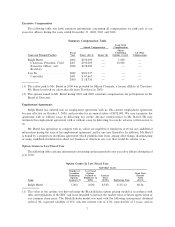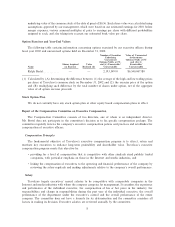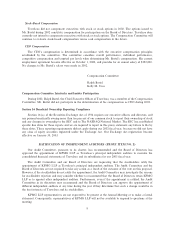Travelzoo 2002 Annual Report Download - page 19
Download and view the complete annual report
Please find page 19 of the 2002 Travelzoo annual report below. You can navigate through the pages in the report by either clicking on the pages listed below, or by using the keyword search tool below to find specific information within the annual report.an additional 4,165,166 shares of common stock will be issued. These shares are reported as outstanding shares
in our Ñnancial statements.
In August 2002, Travelzoo commenced trading on the OTC Bulletin Board. Trading has been very
limited.
Our Market
According to the Newspaper Association of America, travel companies spent $1.4 billion in 2002 on
national advertising in newspapers (source: Market and Business Analysis, NAA, 2003). Based on our
understanding of the industry, we believe that newspapers are currently the main medium for travel companies
to advertise their sales and specials.
We believe that several factors are causing and will continue to cause travel companies to increase their
spending on Internet advertising of sales and specials:
The Internet Is Consumers' Preferred Information Source. Market research shows that the Internet has
become consumers' preferred information source for travel (source: Forrester Research, 2002).
BeneÑts of Internet Advertising vs. Print Advertising. Internet advertising provides travel companies
advantages compared to print advertising. These advantages include real-time listings, real-time updates, and
performance tracking. See ""Ì BeneÑts to Travel Companies.''
New Advertising Opportunities. The Internet allows travel companies to advertise their sales and
specials in a fast, Öexible, and cost-eÅective manner that has not been possible before. We believe this will
lead to greater expenditures by travel companies on advertising sales and specials.
Suppliers Selling Directly. We believe that many travel suppliers prefer to sell their travel services
directly to consumers, as an alternative to the distribution through travel agents. Travel suppliers can sell
directly to consumers by advertising sales and specials via the Internet that attract consumers to supplier's
websites.
Problems Travel Companies Face and Limitations of Newspaper Advertising
We believe that travel companies often face the challenge of being able to eÅectively market and sell
excess inventory (i.e. airline seats, hotel rooms, or cruise cabins that are likely to be unÑlled). The success of
marketing excess inventory can have a substantial impact on a travel company's net income. Almost all costs
of travel services are Ñxed. That is, the costs do not vary with sales. A relatively small amount of unsold
inventory can have a signiÑcant impact on the proÑtability of a travel company.
Our management believes that travel companies need a fast, Öexible, and cost-eÅective solution for
marketing excess inventory. The solution must be fast, because travel services are a quickly expiring
commodity. The period between the time when a company realizes that there is excess inventory and the time
when the value of the travel service has become worthless is very short. The solution must be Öexible, because
the travel industry is dynamic and the demand for excess inventory is diÇcult to forecast. It is diÇcult for
travel companies to price excess inventory. It is diÇcult for travel companies to forecast the marketing eÅort
needed to sell excess inventory. The marketing must be cost-eÅective because excess inventory is often sold at
highly discounted prices, which lowers margins.
Our management believes that newspaper advertising, with respect to advertising excess inventory, suÅers
from a number of limitations which do not apply to the Internet:
‚ typically ads must be submitted 2 to 5 days prior to the publication date, which makes it diÇcult to
advertise last-minute inventory;
‚ once an ad is published, it cannot be update or deleted when an oÅer is sold out;
‚ once an ad is published, the travel company cannot change a price;
3
























